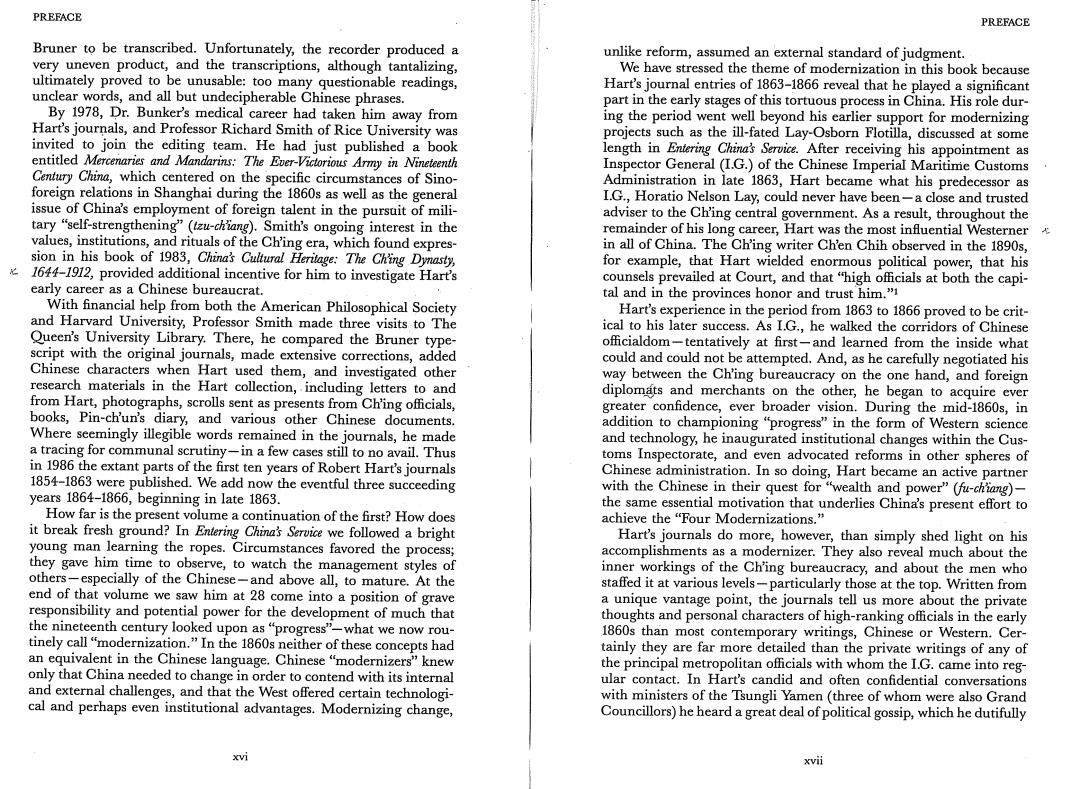正在加载图片...

PREFACE PREFACE Bruner to be transcribed.Unfortunately,the recorder produced a unlike reform,assumed an external standard of judgment. very uneven product,and the transcriptions,although tantalizing, We have stressed the theme of modernization in this book because ultimately proved to be unusable:too many questionable readings, Hart's journal entries of 1863-1866 reveal that he played a significant unclear words,and all but undecipherable Chinese phrases. part in the early stages of this tortuous process in China.His role dur- By 1978,Dr.Bunker's medical career had taken him away from ing the period went well beyond his earlier support for modernizing Hart's journals,and Professor Richard Smith of Rice University was projects such as the ill-fated Lay-Osborn Flotilla,discussed at some invited to join the editing team.He had just published a book length in Entering Chinas Service.After receiving his appointment as entitled Mercenaries and Mandarins:The Ever-Victorious Army in Nineteenth Inspector General(I.G.)of the Chinese Imperial Maritime Customs Century China,which centered on the specific circumstances of Sino- Administration in late 1863,Hart became what his predecessor as foreign relations in Shanghai during the 1860s as well as the general I.G.,Horatio Nelson Lay,could never have been-a close and trusted issue of China's employment of foreign talent in the pursuit of mili- adviser to the Ch'ing central government.As a result,throughout the tary "self-strengthening"(tzu-chiang).Smith's ongoing interest in the remainder of his long career,Hart was the most influential Westerner values,institutions,and rituals of the Ch'ing era,which found expres- in all of China.The Ch'ing writer Ch'en Chih observed in the 1890s, sion in his book of 1983,China's Cultural Heritage:The Ch'ing Dynasty, for example,that Hart wielded enormous political power,that his 1644-1912,provided additional incentive for him to investigate Hart's counsels prevailed at Court,and that"high officials at both the capi- early career as a Chinese bureaucrat. tal and in the provinces honor and trust him." With financial help from both the American Philosophical Society Hart's experience in the period from 1863 to 1866 proved to be crit- and Harvard University,Professor Smith made three visits to The Queen's University Library.There,he compared the Bruner type- ical to his later success.As I.G.,he walked the corridors of Chinese officialdom-tentatively at first-and learned from the inside what script with the original journals,made extensive corrections,added could and could not be attempted.And,as he carefully negotiated his Chinese characters when Hart used them,and investigated other way between the Ch'ing bureaucracy on the one hand,and foreign research materials in the Hart collection,including letters to and diplomats and merchants on the other,he began to acquire ever from Hart,photographs,scrolls sent as presents from Ch'ing officials, greater confidence,ever broader vision.During the mid-1860s,in books,Pin-ch'un's diary,and various other Chinese documents. addition to championing "progress"in the form of Western science Where seemingly illegible words remained in the journals,he made and technology,he inaugurated institutional changes within the Cus- a tracing for communal scrutiny-in a few cases still to no avail.Thus in 1986 the extant parts of the first ten years of Robert Hart's journals toms Inspectorate,and even advocated reforms in other spheres of 1854-1863 were published.We add now the eventful three succeeding Chinese administration.In so doing,Hart became an active partner years 1864-1866,beginning in late 1863. with the Chinese in their quest for“wealth and power'”(fu-ch'iang)- the same essential motivation that underlies China's present effort to How far is the present volume a continuation of the first?How does achieve the "Four Modernizations." it break fresh ground?In Entering Chinas Service we followed a bright Hart's journals do more,however,than simply shed light on his young man learning the ropes.Circumstances favored the process; accomplishments as a modernizer.They also reveal much about the they gave him time to observe,to watch the management styles of others-especially of the Chinese-and above all,to mature.At the inner workings of the Ch'ing bureaucracy,and about the men who staffed it at various levels-particularly those at the top.Written from end of that volume we saw him at 28 come into a position of grave a unique vantage point,the journals tell us more about the private responsibility and potential power for the development of much that thoughts and personal characters of high-ranking officials in the early the nineteenth century looked upon as"progress"-what we now rou- 1860s than most contemporary writings,Chinese or Western.Cer- tinely call "modernization."In the 1860s neither of these concepts had tainly they are far more detailed than the private writings of any of an equivalent in the Chinese language.Chinese "modernizers"knew the principal metropolitan officials with whom the I.G.came into reg- only that China needed to change in order to contend with its internal ular contact.In Hart's candid and often confidential conversations and external challenges,and that the West offered certain technologi- with ministers of the Tsungli Yamen(three of whom were also Grand cal and perhaps even institutional advantages.Modernizing change, Councillors)he heard a great deal of political gossip,which he dutifully xvi xvii